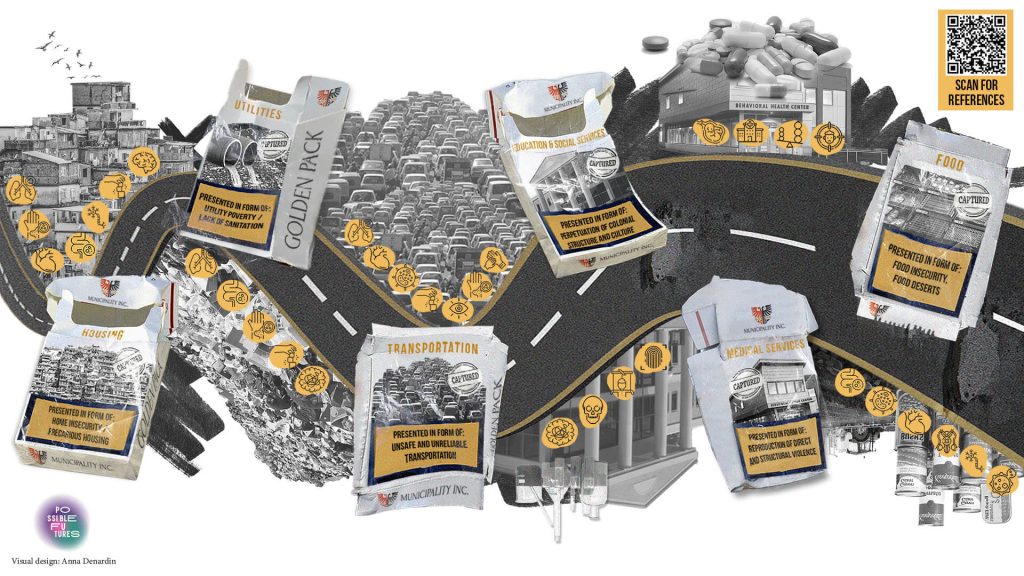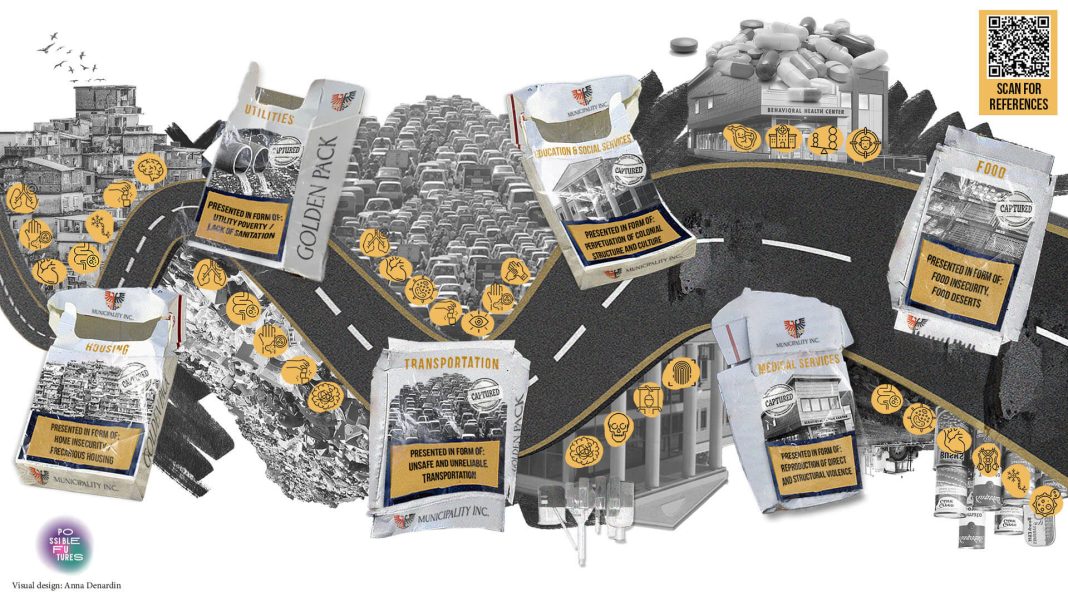Cities across the Global South remain firmly in the grips of their colonisers’ “innovations”, hosting entrenched centuries-old systems and practices of abuse and exploitation that disrupt health and life across the planet. Approaches to urban social sustainability that ignore colonial oppression and its urban-rural interdependencies by design continue to contribute to ongoing planetary systems collapse.
Decolonisation is a newly-trending concept in many fields, and ironically often falls prey to colonial approaches. It is not uncommon to find discourse posing as “decolonial” while in the same breath seeking to establish itself within a colonial world order. The objective of this piece is to introduce and explore urban coloniality from Global South perspectives – not to frame a concept palatable for Global North comfort.
The Colonial City
European colonisation’s One World agenda sought to “correct” all cultures it deemed barbaric and savage. It continues today to introduce the concept of “development” to those who are coerced to partake in the growth of Western civilisation – by building rail systems and electrical infrastructure, by obtaining education certificates at Western European-language schools (destroying traditional knowledges), and by demonising traditional health and medical practices to create dependency on Western pharmaceuticals.
This global project of ethnocide was successful only because of military power: the white men had weapons of mass destruction, and used them liberally.
Global South cities today are dominated by the legacy of European colonialism and modern economic imperialism. Colonisation has effectively reversed global patterns of prosperity prior to 1500, defining cities and urbanisation processes.
“In much of Asia and Sub-Saharan Africa, European powers reshaped economies around agricultural and mining capitalism, restructuring urban systems in the process. Globally-oriented port cities, [whose colonial-era function] was to export raw commodities to the metropole (and later to import manufactured goods), grew most rapidly, while the development of regional, manufacturing-oriented cities, some of which had long histories of proto-industrialism, was undermined. In settler colonies — where the model of extraction involved the persecution, dispossession, massacre, and ghettoization of indigenous or First Nations peoples, then the imposition of systems of slavery and indentured servitude using human labour from Africa and parts of Asia — precolonial societies were so dramatically disrupted that colonial powers almost, though not fully, built settlement systems from scratch.
Colonialism’s legacies are extremely durable and widespread […] Because colonisation powerfully shaped the global division of labour and enforced favourable terms of trade for Northern economies, it created long-term advantages for Global North cities and long-term constraints to high-wage employment and large urban middle classes in Global South cities. Colonial systems of administration also imposed various forms of spatial segregation in cities that have endured as context-specific articulations of the urban land nexus”
Randolph and Storper, 2022
Agricultural and mining capitalism has destroyed rural wealth. The ongoing privatisation of land and food systems since the colonial era has decimated rural economies, while mining operations fuel land grabs, extrajudicial killings, militarised zones, and widespread ecocide. This global system of colonial extraction accelerates the destruction of rural life, driving urbanisation across the Global South.
As a result of this, colonial and white supremacy culture is omnipresent in contemporary human culture. Modern urban culture promotes ideas of development and success structured around Western ideals, incentivising:
- capitalist hustle culture (encapsulating Tema Okun’s white supremacy culture patterns such as sense of urgency, quantity over quality, only one right way, power hoarding),
- compliance with power structures (objectivity, progress is bigger, more, fear of open conflict, worship of the written word),
- pursuit of a privileged life as a moral high horse (perfectionism, defensiveness, individualism, paternalism/patriarchy, right to comfort).
These behaviours are intimately tied to systemic exploitation, maintaining ongoing ethnocide and societal collapse built upon layers of unaddressed intergenerational trauma.
“The colonial relationship required altering the productivity of the colonial society in order that its wealth could be exported to the core nations, and colonial cities centralised this function. Their major cultural role was to house the agencies of this unequal relationship: the colonial political institutions—bureaucracies, police, and the military—by which the core ruled the colony, and the economic structure—banks, merchants, and moneylenders—through which wealth drained from colony to core.”
Colonial and neocolonial urban cultures, Britannica
In 2015 alone, the net appropriation from the South to North was 10.1 billion tons of raw materials, 379 billion hours of human labour, 22.7 quintillion joules of energy, 800 million hectares of land. All this continues to be controlled, organised, managed, and coordinated through Global South cities, shipped through Global South ports, for the benefit of the Global North.
The Global South represents around 85% of Earth’s human population and even more of its ecology.
Urban Health: It’s Political
It is impossible to dissociate urban health from health care systems, social justice, and environmental care. Colonial urbanism perpetuates illness and desolation through systems of separation, through the capture – taking by force to gain control – of fundamental services while providing a bleached illusion of health in its place.
In ignoring layers of colonial trauma, urbanists continue to deepen and entrench societal wounds by design. Modern societies actively create and maintain societal inequalities.
Those who grow up in disenfranchised areas perceive structural violence and exploitation as the norm, where basic health care and social needs are “luxuries”. Ethnocide removes systems of holistic care present throughout nature and pre-colonial societies’ relationships with nature. This is replaced with an abusive culture that encroaches upon human and more-than-human limits. Coloniality sustains the privileged classes who profit in greedy complicity while insisting on ignorance, their right to comfort, and their entitlement to opulence.
Colonial urbanism amplifies colonial mentalities as a function of intentional and unintentional design of urban culture. Municipal policy- and decision-makers benefit from colonial urbanism – financially, politically, socially. Policy- and decision-enforcers are trained for colonial control. By design, basic services in the colonial city are captured.
Housing – Captured
The urban poor are denied access to land or safe and liveable housing, rights to fair rent, and the rights to exist in cities – displaced repeatedly to the ever-precarious margins.
Slum clearances and gentrification are just a couple of the mechanisms at the disposal of municipalities. Colonial urbanism requires slave-wage workers who are systematically priced out of the city and actively targeted for organising unions.
Utilities – Captured
Infrastructure privatisation and unregulated services lead to unreliable supplies at best and causing death by fuel poverty at worst. Poor or no drainage infrastructure causes localised flooding that disrupts traffic, exacerbates inaccessibility, and poses health and safety risks.
Water rationing is often in effect due to poor utilities management – though never in wealthy neighbourhoods, whose uninterruptible power supplies cause the brownouts that are so common everywhere else.
Electrification accelerates the consumption of colonial propaganda – it’s how colonial urbanism works – through the radio, the television, the smartphone – infiltrating identity and culture for the purposes of ethnocide. When the urban poor are priced out of utilities, it’s clear who the system is designed to serve.
Transport – Captured
The dream of public-private partnerships is a fantasy that maintains extractive capitalism. When it does work, it’s for the benefit of those who have systematically gained from the city. The majority continue to struggle to commute, yet are expected to provide convenient services for the urban elite.
Inadequate profit-driven management generates safe and accessible options only for some of the city’s able-bodied males. Pavements, the lowest common denominator in any transport system, are simply not priorities. Sabotaged governance systems negate local investments in accessible, regulated metro-wide and inter-city public transport infrastructure – those are reserved for wealthy neighbourhoods, through private colonial-heritage capital and dynastic development corporations.
The privileged win where the urban context is built for every-man-for-himself: car ownership finds its place in the urban dream.
Education – Captured
“Advanced” Western knowledge is incentivised as the only way to pursue progress and success, leading to inequality as the logical result. This epistemicide, the destruction of knowledge systems, continues erasing diverse, endemic, ecosystemic worldviews by design.
This monoculture of perception subverts cultural diversity and intercultural relationships, bleaching societal resilience into sanitised compliance at the behest of the authorities.
The privatisation of education strengthens a hegemonic education system where Western colonialism is sold, preached, and internalised, installing foundations of colonial thoughts and fears that perpetuate global systems of oppression. It causes the abandonment of traditional and indigenous histories and knowledge systems, and silences decolonial narratives that oppose modern Western civilisation. Colonial cities boast Western education offerings, proudly advertising recent graduates’ high scores on large road-facing banners. A Western education is taught as the only way to escape poverty, to achieve success, and to gain social status.
Social Services – Captured
Imposed scarcity offers limited centralised resources, supporting a specific few in specific contexts. It requires a narrow, exclusive approach that adeptly ignores the diversity of human (and more-than-human) needs and corresponding forms of care.
Superficial systems of care are put in place as an illusion that useful services are offered. It encourages passive-aggressive mechanised relationships that position themselves as “well-intentioned” while breeding societal poisons such as structural racism, misogyny, classism, ableism, ageism, hetero-monogamic norms, etc. This brings more illness than health, selling dependency as liberation – a model fit for late-stage capitalism.
Medical Services – Captured
Colonial wealth and perspectives fund research and healthcare education, prioritising lifestyle ills of the privileged. A definitive lack of accessible medical services for everyone else is topped by an absence of culturally safe spaces and strategies to serve local populations.
Traditional endemic approaches to health and medicine have been vilified and marginalised over centuries through colonial education. Western health separates physical, mental, spiritual, and societal health, pruning dominant concepts of health by disassociating from, and delegitimising, non-physical aspects.
Food – Captured
Big Agriculture-supplied urban food systems destroy rural life. This is one pervasive way the colonial city makes everything it touches colonial.
Food systems control who has reliable and uninterrupted access to healthy and nutritious food to maintain healthy and active lives. Food insecurity is viewed not as a symptom of a broken societal system, but rather as an unavoidable function of the luck-of-the-draw black box that is urban economics, intentionally perpetuating incumbent power structures.
Colonial food systems claim land ownership by displacing people impoverished by centuries of colonial violence, engage in forest-clearing and pollutive extraction, destroying soil health beyond recovery, and promote food-as-global-commodity and non-traditional, non-local cuisines. Public policies allow food deserts to proliferate in cities, targeting repeatedly displaced populations who already experience systemic barriers to basic urban services.
There’s Been a Murder: Coloniality Kills
Globalised capitalism is designed to profit from coerced dependencies on local, regional, and global levels in order to guarantee cheap, ready, desperate labour to serve the privileged classes. Housing insecurity, fuel poverty, unreliable and unsafe transport systems, ecocidal and ethnocidal education and food systems, racist and classist social and medical services – in colonial cities, these are features, not bugs.
A host of physical and mental illnesses are associated directly with urban coloniality. The infographic below shows several systemic examples.

Image credit: POSSIBLE FUTURES / Anna Denardin (scan QR for bibliographic references).
It is expensive to be poor: Urban systems ensure this, even if they don’t have to. The price is paid with years of human life, often several generations’ worth.
Urban life is marketed as a certain youthful independence or freedom tinged with a romantic wistfulness for urban landscapes, most clearly seen in rental ads for studio flats in condominium estates. It’s a mirage: proximity to privilege does not equate to health or wealth.
“Succeeding” in urban life is culturally celebrated as an initiation rite into a capitalist adulthood, where European café culture and American vintage fashion are perks. It’s supposed to be impossibly hard: failure can only be a result of insufficient resilience and toughness on the part of the individual.
Decolonial Urbanism?
In our haste for comfort, we seek to bypass the hard and long processes of change to imagine anew, as if it magically appears by copying case studies. The decolonial city is definitively not the post-colonial city – responsible decolonisation is that long and painful process of intentional cultural change, and the creation of a social and systemic environment conducive to such an era of open experimentation and critical interrogation.
What is a decolonial city? Decolonisation as an urban project is a public affair far beyond “participatory design” or “local traditional knowledge”, centring those most harmed by urban life, seeking constant challenge from local decolonial thinkers. The objective of a city decolonising itself is to sustain cultural and institutional change that dismantles and disarms colonial systems of oppression – systems that stretch far into the rural realm. By definition, practical decolonisation of colonial cities requires the active pursuit of deurbanisation, and the regeneration of rural wellbeing through cultural sovereignty, funded by urban wealth.
This is of course not going to happen on its own: global power structures push propagandised narratives through lobbying intensives to ensure that cities do not subscribe to the end of cities. Considering ongoing planetary systems collapse, POSSIBLE FUTURES perceives urban decolonisation as a rapid and unavoidable process of cultural radicalisation within urban systems collapse, as the ruling classes continue to abandon sinking, food-poor, pandemic-stricken metropolises for protectionist luxury rural solutions offered by mercenary-secured techno-feudal urban futures.
If colonisation may be seen as a standardisation of all things, then decolonisation is about dismantling standardisation, to reinstate cultural sovereignty – and hence systemic wellbeing and societal care – through reparative justice and collective therapy. This process therefore looks different for each population in each place, with varying degrees of difficulty related to having to reckon with colonial urbanism’s many long-ranging violent and ethnocidal traumas.
This article was written for CityChangers.org by Samantha Suppiah, a former Young Leader and design strategist for decolonial sustainability and regeneration, and Luiza Oliveira, designer and facilitator of decolonial futures for systemic health. As part of POSSIBLE FUTURES, Samantha and Luiza explore decolonial urbanism through interrogating entrenched systems of oppression. Our gratitude also for the invaluable contribution of Athena V. Mercolisia, an independent urban creative and stray welfare advocate, and a life-long resident of an informal settlement in Parañaque City, Philippines.
References
POSSIBLE FUTURES have compiled the list of bibliographic references for the infographics included in this article. For references and further information, click here or scan the QR code below.




[…] Possible Futures, Colonial Urbanism article: https://citychangers.org/editorial-colonial-urbanism/?cn-reloaded=1 […]